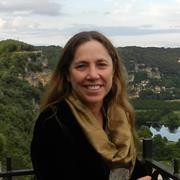
The world’s soils and their cycling of carbon and nutrients play a critical role in ecosystem productivity and helping to keep carbon out of the atmosphere. Because soils contain three times the amount of carbon as the atmosphere, the release of even a small fraction of this carbon could profoundly impact the global climate. To improve ecosystem models, CESD researchers study interactive soil processes affecting microbial, hydrological, and thermal dynamics – each important for healthy soil carbon storage, plant growth, and water quality.
A team of CESD scientists is investigating how soils and soil microbes are responding to changes in environmental conditions by conducting soil-manipulation experiments in California forests. For example, they were the first to show that deep-soil warming resulted in a larger than expected loss of soil carbon, meaning that higher soil temperatures result in less carbon storage in soil. These researchers leverage observations from the field as they work to improve the ability of computer models to portray soil carbon cycling.
Additionally, our researchers are developing an instrument that can better monitor and quantify soil carbon on agricultural lands, and discovering how other disturbances like wildfires and land degradation impact the ability of soils to store carbon.








